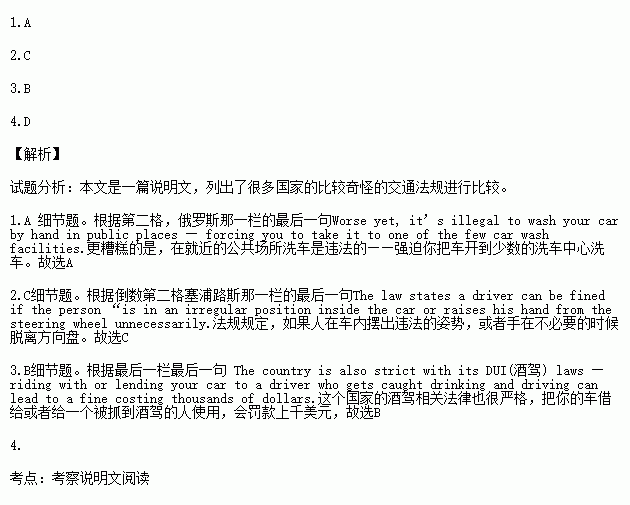题目内容
There are some strange driving laws in different countries.
Countries | Laws |
Vietnam | If you’re in Vietnam without a Vietnamese driver’s license, you risk a prison sentence of up to three years. |
Russia | In Moscow, if your car is dirty enough to draw dust art, you will be fined about 2,000 rubles (about US $55). Worse yet, it’s illegal to wash your car by hand in public places — forcing you to take it to one of the few car wash facilities. |
Thailand | Drivers —male or female — can’t drive shirtless, whether it’s a car, a bus, or a tuk-tuk cab. |
France | France requires its drivers to carry a portable breathalyzer(酒精测量仪) at all times when driving a car. The one-time breathalyzer cost around US$5, and if you don’t have one, you will be fined US$15. |
Cyprus | Raising your hands in the car can get you fined of US$35. The law states a driver can be fined if the person “is in an irregular position inside the car or raises his hand from the steering wheel unnecessarily. |
Japan | Politeness isn’t just the culture in Japan; it’s part of driving laws. Splashing a person by driving through a puddle(水坑) with your car will cost you over US$60. The country is also strict with its DUI(酒驾) laws — riding with or lending your car to a driver who gets caught drinking and driving can lead to a fine costing thousands of dollars. |
1.Where should you go to wash your car when you are in Moscow?
A. The car wash facilities.
B. Any public place
C. Your home
D. The forest
2.What can get you fined for in Cyprus?
A. Forgetting to carry a portable breathalyzer.
B. Not having a Cyprus driver’s license.
C. Putting your hands above your head when you are driving.
D. Driving without a shirt.
3.If you are fined thousands of dollars in Japan, you may have been ____.
A. in an irregular position in your car
B. sitting in a car with a drunk driver
C. splashing a person with mud
D. impolite to other drivers
4.This text can most likely be found in _______.
A. a law document
B. a fashion magazine
C. an international newspaper
D. a column on interesting cultures
根据以下所给的信息,介绍苹果公司的最新产品苹果智能手表。
产品名称:苹果牌智能手表 外形特点:它被视为戴在手腕上的小型计算机, 采用了蓝宝石屏幕与Force Touch触摸技术,有银色、金色、红色和白色等多种颜色供选择。 功能:可以发邮件、短信、支付网购产品和导航;智能手表还可以监控佩戴者的健康状况和强壮程度。如果想使用智能手表的大部分功能,最好与iPhone同时使用。 价格:$349~$10,000 购买信息:4月10号接受预定,4月24号在美国及其他8个国家出售。 |
参考词汇:蓝宝石屏幕 Sapphire screen 预定 pre-order 导航navigation services
【写作要求】
只能用5个句子表达全部内容。
【评分标准】
句子结构准确,信息内容完整,篇章连贯。
________________________________________________________
________________________________________________________
________________________________________________________

